As preppers, we know the importance of having plenty of water stored. It’s critical, more important than stocking bulk survival food, and far more important than storing ammo. If you’re not prioritizing the creation of an emergency water supply first – you’re doing it wrong.
In this article, we’re going to look at two stackable water storage containers, a WaterBrick vs AquaBrick comparison.
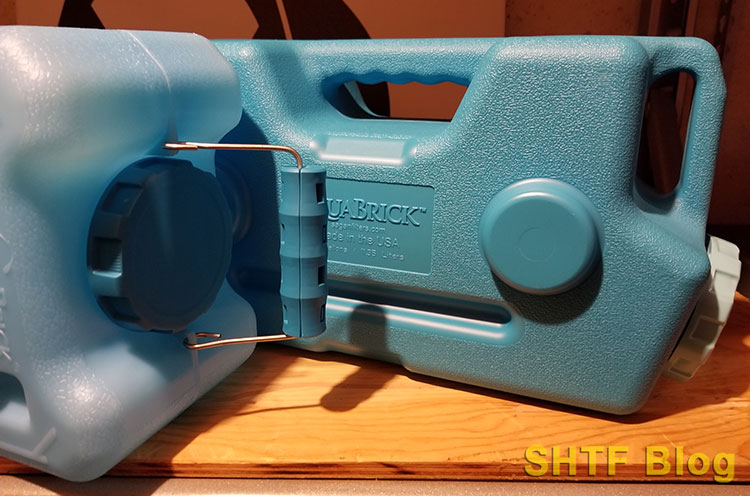
I’ve written about water storage containers before, reviewing both the Sure Water Tank (my mother ship container) and the mid-sized Wurx container. Both of these containers are significantly larger than the containers I’m reviewing in this article.
So maybe we start by posing a question…
Why Buy a Small Water Storage Container?
I own and use small, mid-sized, and large water containers. I like the diversity. Each size comes with its own advantages, and consequently, its own disadvantages.
My large Sure Water Tank enables me to to store nearly 300 gallons of water in a very small footprint. However, it’s 86″ tall and weighs a ton when full (2,168 pounds to be exact). It must be placed on a concrete slab or a seriously reinforced floor.
Advantages to large water storage containers:
- You can store more water.
- You get more water stored for the price of the container(s).
Disadvantages to large water storage containers:
- Your storage container is not portable.
- They require a lot of space.
- They are very heavy.
What type of storage container is best for you depends entirely on your situation:
- How many people you’re preparing for.
- Whether you have municipal water or a well.
- Whether you own a home or rent an apartment.
- The size of your dwelling.
For me, I prefer to cover all bases and have a variety of different sizes, but your situation make call for one container size and not another. If it helps as a guide, we have published a water calculator to help you determine how much water you need to store. That’s where you should start before investing in containers.
Small Stackable Water Storage Containers
The smallest, practical-sized water container is a simple one-gallon jug. Jugs that would otherwise get recycled can be cleaned and repurposed for water. Water jugs can be purchased by the gallon at any grocery store. They’re very portable.
For most people, however, myself included, one-gallon jugs just aren’t worth it. They’re bulky for the small amount of water they hold and you can’t stack them on top of one another to maximize space.
I prefer purpose-built water storage containers. Containers that have been designed from the outset for long-term water storage. While there are a variety of different offerings in this category, it largely comes down to two: the WaterBrick and the AquaBrick. Two types of containers with very similar names, similar purpose, and relatively similar pricing.
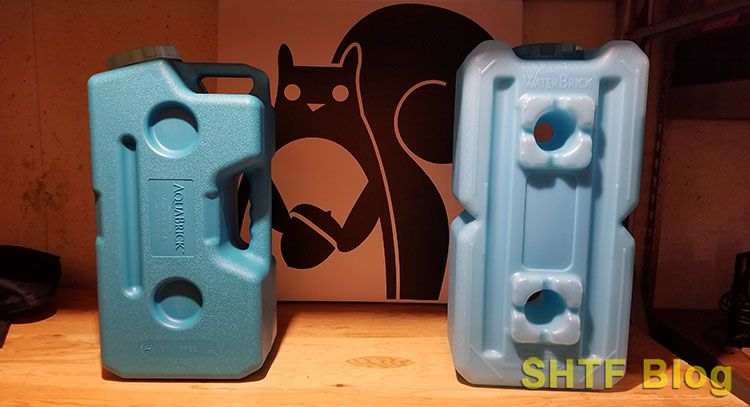
I’ve tested out both of them firsthand so you don’t have to. My AquaBricks came from SaganLife and my WaterBricks came from Sportsman’s Guide. The WaterBrick (as of this writing) is also available on Amazon whereas the AquaBrick is only at SaganLife.
- Portable: comfort handle makes it easy to carry and secure in cars, boats or ATV's
- Stackable: unique design securely stacks to maximize limited storage space
- Customizable: perfect disaster relief container for storing food, water or anything you want to keep dry
- Convenient: Stack and store anywhere you need it or grab and go
Following is my comparison of the two.
WaterBrick Features
The WaterBrick is marketed as a portable water and food storage container that is “easy to carry and secure in cars, boats, or ATVs.” It is made in the USA.
The carry handle, which you can see in the first picture in this post, is a metal/plastic handle that folds over around the cap. It has finger grooves to make carrying it more comfortable.
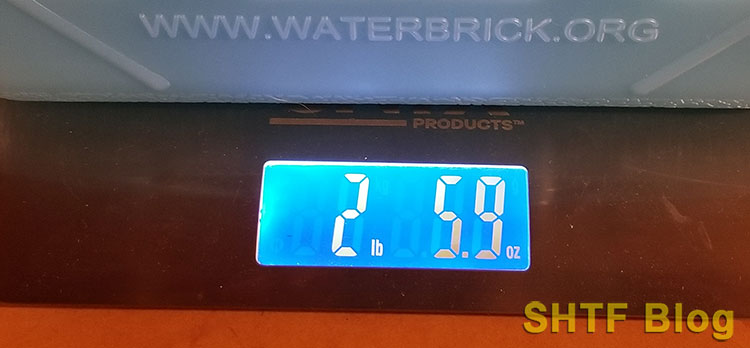
The WaterBrick can be stacked one on top of the other one their side, two holes running through each container where the containers stack.
AquaBrick Features
The AquaBrick is marketed as “a multi-use water storage container” with a spigot cap that makes it “perfect for camping, picnics, and kids sport events.” It is also made in the USA.
The carry handle, as seen in pictures above, is built into the unit itself. There are actually two, one at the top and one at the side allowing for different carry positions.
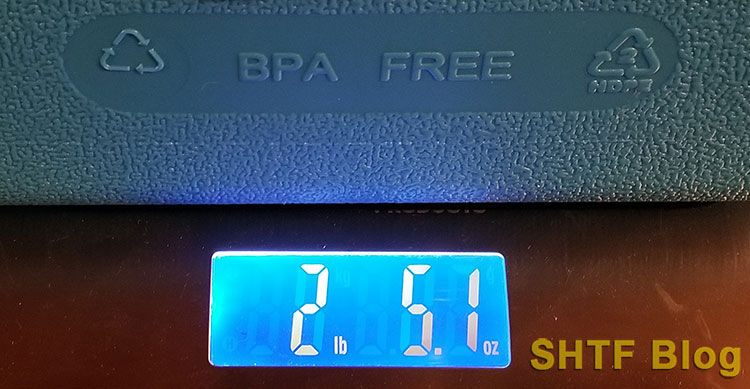
Similar to the WaterBrick, the AquaBricks stack on top of one another as they lay on their side. The AquaBrick does not have the two holes running through it for stacking by indents that provide the stacking stability.
SaganLife offers additional features with the AquaBricks they sell, features I could not readily find with the WaterBrick.
The AquaBrick comes with a spigot as a standard feature. This, in my opinion, is a critical feature. It makes your storage device far more versatile and easier to dispense the water. This makes me far more inclined to get more use of the AquaBrick as I can use it not only for emergency water storage but also for camping, outdoor activities, etc.
Another (optional) feature is the AquaBrick Water Purification System add-on. Like the spigot, this optional system extends the versatility of the AquaBrick by incorporating a system that allows the user to pull water from a questionable source (river, stream, pond, etc.) and run it through a filter and into the AquaBrick. This proprietary system purifies up 700 gallons of non-salt water.
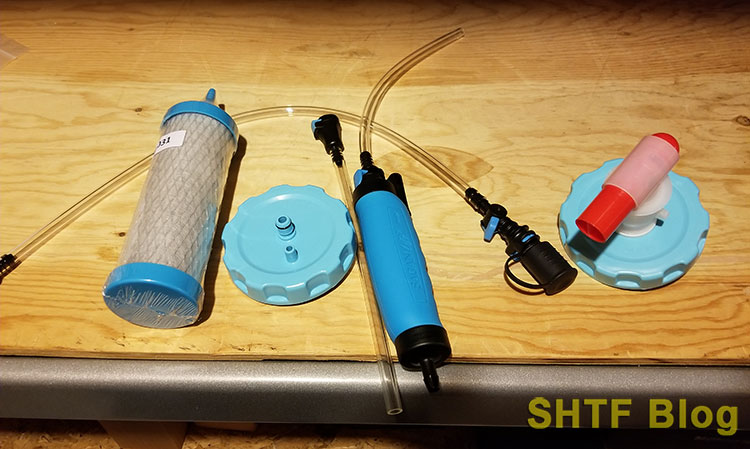
Another optional feature to the AquaBrick is a special-made funnel that makes filling the AquaBrick with food easier. Pictured below in dark blue and set into the mouth of the AquaBrick (laying on its side for easy viewing), the funnel makes filling the device with rice, beans, etc. much easier.
Both the WaterBrick and the AquaBrick are advertised as being suitable for both water and food storage, but the AquaBrick is the only one with a purpose-built funnel. This funnel also works in wide-mouth canning jars – convenient!
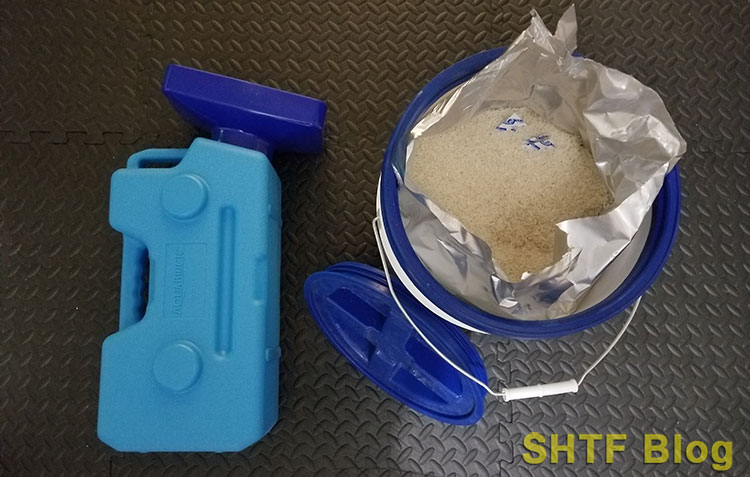
WaterBrick vs AquaBrick
If you’re here wondering which storage container you should buy, consider the following specifications:
| WaterBrick | AquaBrick | |
|---|---|---|
| Volume Capacity | 3.5 gal | 3 gal |
| Height | 6″ | 6″ |
| Depth | 6″ | 9″ |
| Length | 18″ | 18″ |
| Weight (empty) | 2lb 6oz | 2lb 5oz |
The biggest advantage to the WaterBrick is that it holds a half gallon more. Dimensions are otherwise close to the same. How is it possible that the WaterBrick holds more in about the same physical size? Construction and design.
The AquaBrick carved space out for two built-in handles that are stronger and more thoughtfully designed than the simple wire-type carry handle with the WaterBrick.
Empty weights are also very close. While the material in the WaterBrick covers more volume space, the material in the AquaBrick feels thicker. I attempted to determine if this was try by shining a light into the two to compare light differences.
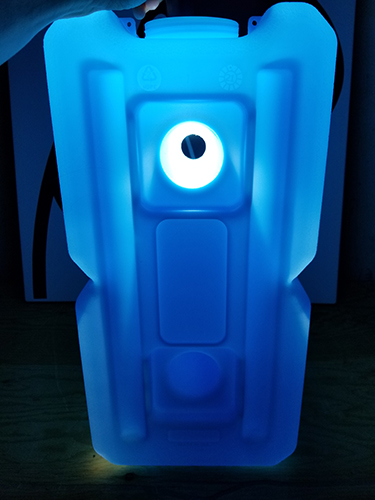
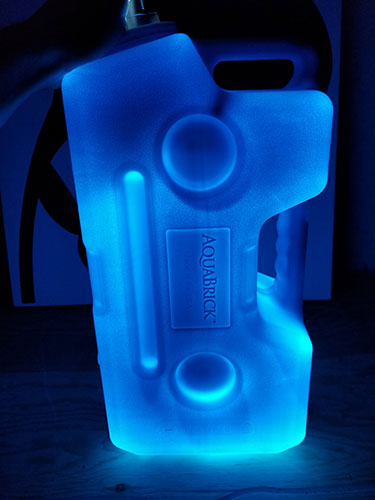
Using the light to try to determine plastic thickness of each container didn’t work very well because of the design of each. It wasn’t an apples to apples comparison. You can see in the WaterBrick picture (above left) that the light just bounced off the center piece that cuts through the container.
Pricing between the two units is very close, a negligible difference. However, it is easier to buy a single WaterBrick whereas the AquaBrick seems to be sold in a pair (at minimum). This was fine by me as I wanted at least two of each anyway.
The AquaBrick is my favorite small water storage container between the two options here. It has what feels like a more solid construction, the carry handles are stronger and better designed, and it comes with more optional accessories that make it more versatile. The overall design is better and seems better suited to the prepper market.
Other Stackable Water Storage Containers Not Reviewed
The only other water storage container in this category (small and stackable) is the API Kirk containers. Unlike the Aqua and WaterBricks, these are square in shape and hold 5 gallons in each container.
They are stackable (to a point) and are sold in a pack of six allowing a total of 30 stored gallons of water. The pack comes with one spigot and a wrench.
- PORTABLE: Drums are great but you can't take them with you. Compact storage in handy 5-gallon units. Garage to pickup to kitchen counter to campsite, your emergency water is now a portable resource.
- STACKABLE: Geometry on the top of each container aligns with contours on the bottom for convenient stacking (ref detailed description below). Each container is approximately 11.25" x 10" x 14.25" tall...
- SAFE: High Density PolyEthylene (HDPE) is a preferred polymer. HDPE is not a candidate for BPA, a reassurance for those of use requiring BPA free containers. The industry term is "BPA non-intent". The...
- ACCESSORIES: Your Samson Stackers will come with a factory installed dust plug that can be discarded when ready to use (see details below). Each container also includes a gasketed cap with Rieke (TM)...
What are your thoughts? Do you have experience with either of these units? Do you use something else entirely for water storage? Let us know in the comments section.


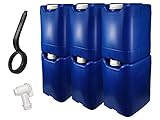
1 comment
The important thing with stackable 5 gal jugs is that they not leak. When the lid is on the side, they can leak! The best and least expensive ones I’ve found are $16 each at IFA farm supply in Utah.